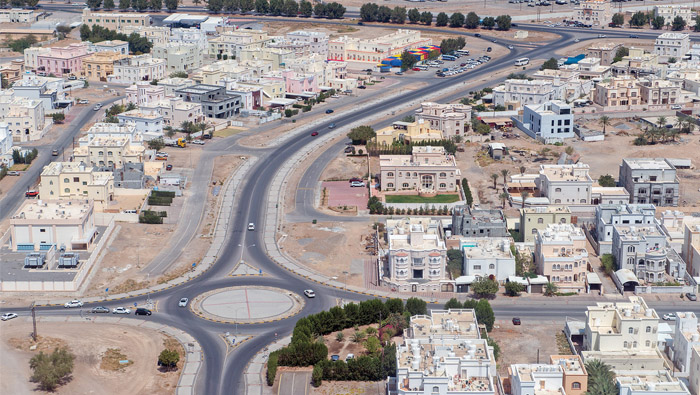
Muscat: Oman’s real estate sector is expected to grow by 40 per cent in 2021, owing to measures by the government making it easier for Omanis and expats to own property.
Among these are reducing real estate transaction fees from five per cent to three per cent, enabling expatriates to own properties in mixed use residential and commercial buildings, and allowing developers to add extra floors to their buildings in exchange for a fee, said Hasan Al Ruqaishi, the head of the Real Estate Development and Construction Committee at the Oman Chamber of Commerce and Industry (OCCI).
“With the new financial year having begun for companies and banks in the country, we expect this rate to exceed 40 per cent,” he said. “For example, in Barka, after these decisions were made, the value of land rose by up to OMR1,000 a plot, because these decisions have helped both demand for land, and its sale and purchase.
“We have had instances of people requiring to pay more money towards ministry fees, than they receive from property sales to another person. A person, for example, might receive a profit of OMR100 from his property sale, but he has to pay OMR180 in ministry fees. The fees increases in proportion to the price at which the property is sold,” Al Ruqaishi added.
“The decision to raise real estate fees to five per cent began in 2016, and this had a great impact on real estate sales. As a result, revenues to the Ministry of Housing and Urban Planning decreased as well.”
Real estate fees were reduced after discussions between real estate sector representatives and the ministry, bringing them back to pre-2016 levels.
Under the previously existing fee structure, the property speculation market had reached a stagnation rate of 70 per cent, while a 30 per cent stagnation was seen in property purchases deemed necessary.
“There are two reasons people invest in real estate: the first is according to their needs, and the second is for economic reasons. “These new measures will definitely affect greater economic activity in real estate, as a large number of people in this country are employed in the property sector,” said Al Ruqaishi.
“With more sales of real estate units, they will receive more liquid money to spend on goods and services for their families and themselves.”
While Al Ruqaishi did praise these initiatives, he said more needed to be done to encourage more investment in Oman’s real estate. Using the right for expatriates to lease flats in mixed-use multi-storey properties under usufruct agreements as an example, Al Ruqaishi said non-Omanis who would be more motivated in these schemes if they received residency in exchange for their investment, as is offered to property buyers in place such as Madinat Al Irfan and Al Mouj.
“Any expat who seeks to obtain residency in Oman will obviously want to own their property in the country,” he explained.
“If he is not offered that, he might be discouraged to invest under the current schemes, because he might lose his job, and will then not be able to fulfil any monthly payment obligations towards paying for his property,” Al Ruqaishi said. “Moreover, he will also be unable to sell his house, because the rules prevent him from doing so until four years have passed from the time he has bought his flat,” he added.
Al Ruqaishi also addressed the issue of a lack of parking spaces in many buildings, which cause inconvenience to many of the tenants living in them, as well as visitors to these places.
“We proposed that investors could build additional floors within buildings to be used as parking lots,” he explained. “Investors who are allowed to do so will have their structures checked to make sure they are safe and stable. Should an investor choose to increase the numbers of floors in an existing building, an advisory committee from Muscat Municipality will first look over the matter and then get back to him with a response concerning the same.”
Explaining the employment opportunities the real estate sector provides for people in the country, Al Ruqaishi said it could generate work for 30 percent of Omanis of working age.
“We have suggested transferring some of the services run by the municipalities and the Ministry of Housing and Urban Planning, to real estate offices in the country, so that jobs can be provided for those seeking work, which will help keep pace with the government objectives of hiring Omanis and creating more employment opportunities for them,” he revealed.
“We need to look during the current Five Year Plan at redeveloping cities in Oman by changing their infrastructure, bringing in advanced sewage and gas networks, and reduce congestion found in some areas, by building foot bridges and increasing the access points between these places and those around them.”